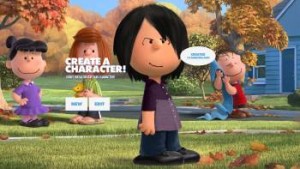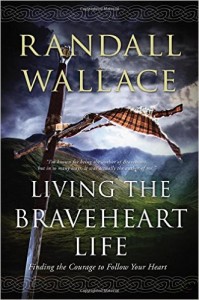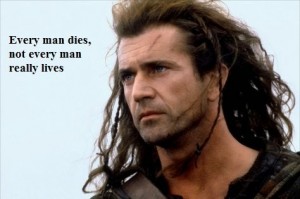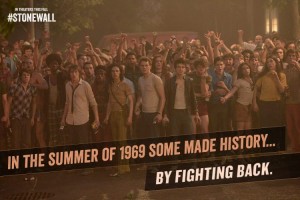Make Yourself Into a Peanuts Character!
Posted on September 26, 2015 at 8:00 am

Posted on September 26, 2015 at 8:00 am

Posted on September 25, 2015 at 4:51 pm
I have 40 pairs of ticket to give away to the outstanding drama “99 Homes,” starring Andrew Garfield as a construction worker who loses his home in a post-subprime meltdown foreclosure. Desperate to support his mother and son, he takes a job with the man aptly named Carver (Michael Shannon) who is making a fortune from the foreclosed homes.
The screening is Monday, September 28, 2015, in Washington DC. The first 40 people to respond through this link will each get two passes. NOTE: Seats are not guaranteed. They given out first come, first served, so get there early. Enjoy!
Posted on September 25, 2015 at 3:36 pm
Randall Wallace tells his story, from seminarian to songwriter to screenwriter of the Oscar-winning “Braveheart” and other inspiring films in his new book, Living the Braveheart Life: Finding the Courage to Follow Your Heart. It was a great pleasure to talk to him.
You write a lot about fathers in the book. Why are they so important?
I think in everybody’s male or female, we come to see our dads in a unique way. They represent a kind of strength or weakness. They represent a power. They are our first contract with the mystery of manhood. I heard years ago, I believe it was when I was in the seminary, that some psychologists say that the way we feel about God is almost always directly linked to the way we feel about our own earthly fathers. That if our dads were loving and kind and strong then we tend to think of God that way. If our dads were violent and brutal and unpredictable then we have that impression of God and we spend our lives dealing with that. I say in the book that I believe the father relationship is one of the pinnacles of the Braveheart life, and I mean that not even if it’s not your biological father, you need to find a man in your life you can respect and you need to find someone in your life that you can parent even if that’s not your biological child. And not necessarily mean to raise them from infancy but to have that kind of loving, caring relationship with.
Was there really a piano-playing pig you named Pigarache?
Absolutely true story Nell. I majored in religion and spent a year in seminary after that and got the opportunity then to go to Nashville to explore writing and writing songs like Kris Kristofferson. He encouraged me to go to Nashville and my first job manager at the animal shows at Opryland, USA. And one of the shows that I managed was called Barnyard Animal Opry. We had 8000 people a day who would see this show. The barnyard animals were trained to play musical instruments. We had a razorback who played the piano and I named him Pigerache and put a little bright, red sequin bow tie around his neck. He was a show stopper I tell you. You can imagine how proud my parents were.
You are great at creating strong female characters in your films, and in the book you talk about women warriors. 
The first book I ever did, the first two books in fact, had women as the main characters and one of the greatest compliments I ever got was when an editor from New York who was not my editor said she thought Randall Wallace writes the strongest women characters in fiction today. I thought that was a really striking compliment particularly because I didn’t think of a particular difference. When people ask me how I write strong women characters I’ve always said I just imagine myself in the situation that they are in and I suppose that their feelings in that situation would be mine, that we all long for a reason to have faith, even in the darkness. The power of believing as opposed to knowing, meaning that when we know or we think we know we’re relying on what we take to be facts but when those facts are proven to be wrong then our knowing crumbles. When we believe we are acting on something that’s greater than knowledge, we’re acting on a hope and courage. Women I believe manifest that sometimes in a deeper way than even men do because women rely on their intuition more than their brute strength and intuition I think is one of the first steps on the road to faith.
You’re not ashamed to talk about faith but that’s very rare today. Why do you think that our culture makes it so difficult to acknowledge that?
I believe the difficulty arises from what we have all perceived to be the falseness of people who present themselves as having faith when what they’re trying to do is convince others of what they don’t believe themselves and that is manifested in the people who preach a certain morality and don’t live by it themselves. People who preach tolerance but are in fact intolerant. The strange thing about this is that intolerance is so often manifested by people who claim to be tolerant. That is the secular world is more hypocritical it seems to me than the faith based world is. We’ve entered the age of the thought police in which we want to say that it should be illegal to hate. And hatred is hateful. Hatred is heinous but we are free creatures and if we suppress the freedom of other people then I believe what we lose is their freedom to change and grow and love. I didn’t invent that way of being. I believe God did. That’s why we are creatures of free will. God created us I believe and I say this in the book for the purpose of love and that’s why we have the choice to love or not because if we don’t, it’s not love, its fear and God is the opposite of fear.
The word “freedom” of course is very important in “Braveheart” and which you have it carved on your mantle.
And carved into the stone of my heart.

Nell, all I have to use is metaphors. I don’t pretend that I have now figured out how to replace freedom with new rules of my own. I see freedom as the power to grow. Freedom from fear. Freedom to move into a life of faith, freedom to live a brave life. I think that the restriction on our lives is an idea that everything we do matters, that we are God. I think the fundamental problem is the violation of the first commandment and that all the other commandments are wrapped up in the first one, love God with all of your heart, with all of your soul, have no other God before me. If we are saying that God is our physical lives then we will be condemned to a life of fear and trying to hold on to what we can’t hold on to. Young people ask me a lot when I’m teaching it various schools. I’m frequently asked by sincere, ambitious, young Christians, “How do you hold onto your faith in a business and an atmosphere that is so hostile today?” And I tell them that I don’t hold on. Holding on is fear and I’m manifesting what you just described. If I am afraid that someone else’s expression of their belief or their disbelief in anything that I believe is going to make me crumble then I am rigid and dead. If I am alive and open and trusting that whatever challenge I encounter I don’t have to come up with the answer to that God will give me the strength, the wisdom, whatever it is that I need or even the silence whatever it is that I need to respond and to grow myself and I am the only one that I am really responsible for or. And I think I said in the book there was a rabbi who once said, “if you don’t see God in other people they’ll never see God in you. “And I try to do what Jesus saw, when Jesus saw in the outcasts of society people who were flawed in every way, he saw in them the love of God. And those people were the quickest to recognize that he was the son of God.
My favorite insight from the book, which I think you’ve put very beautifully, is when you say that prayers makes us listen. I think that’s something that is fundamentally misunderstood by many people about the purpose of prayer. So I’d like you to talk about that.
This comes from hard personal experience. I so often approach prayer out of fear. My fear is that whispering voice inside me that it says if you don’t say just the right words or if you don’t pray for everyone you love every single day then God is going to let those people be hurt and God is going to turn those words against you. This is not the voice of God. Jesus clearly teaches the Father knows what’s in your heart already and who of you has a son ask for a fish would give him a stone so don’t worry about the words. And then I think I’m always giving God advice: make these to do lists for God. “I know you’ve been waiting for instructions from me.” [Laughs} It goes to that humility that says God is God and God and I’m just trying to bring myself into hearing God and listening for God. And that’s part of what I need to tell myself every day in one of my prayerful meditations that I listen for God. I don’t hesitate to do that, to pray for others. I think the Bible teaches that we should intercede but it’s not my power or my responsibility that work there. It’s God. Clearly I don’t do very well in the rest of my life but I need to listen and I recognize it and prayer reminds me of that. That’s part of the majestic mystery of prayer.
Posted on September 25, 2015 at 2:24 pm
If you’re a Masterpiece Theatre/BBC in America fan, prepare for greatness. The BBC is going to start its own channel for streaming video in 2016. According to the Atlantic:
The archives the BBC (affectionately called “The Beeb” in the U.K.) could offer up are staggering to contemplate. The network has offered original TV programming since 1929, starting only three years after the invention of the television, and it’s impossible to summarize its greatest hits. Yes, there’s many a famed costume drama in its vaults, along with legendary sitcoms and sketch shows. There are some of the earliest and most influential pieces of science fiction, and gritty real-life dramas. Highlights might include Andrew Davies’s 1995 adaptation of Pride and Prejudice starring Colin Firth and Jennifer Ehle, or Monty Python’s Flying Circus, or Ricky Gervais’s The Office, or the 12 glorious episodes of Fawlty Towers, or the epic masterpiece of social storytelling that is Peter Flannery’s Our Friends in the North.
Posted on September 25, 2015 at 8:00 am
D| Lowest Recommended Age: | Mature High Schooler |
| MPAA Rating: | Rated R for sexual content, language throughout, some violence and drug use |
| Profanity: | Very strong and crude language |
| Alcohol/ Drugs: | Drinking, smoking, drugs |
| Violence/ Scariness: | Police brutality, riots, reference to murders |
| Diversity Issues: | A theme of the movie |
| Date Released to Theaters: | September 25, 2015 |
In 1969, when the federal government prohibited the firing of gays and lesbians, when it was illegal for them to congregate in a bar or even to have consensual sex, when police harassment and brutality was not only permitted but expected, a man threw a brick, shattered a window, and began four days of riots that galvanized the fight for GLBTQ equality. The window was in a bar called Stonewall, and its name lives on as the symbol of the moment that ignited a revolution.
The movie “Stonewall,” intended as history and tribute, instead throws a brick through the meaning and the moment, shattering both. This movie is more than bad and worse than disappointing. It is a tragic distortion of a vitally important story that insults the people it tries to honor and insults its audience as well. Director Roland Emmerich (known for movies with a lot of big explosions and stunts) and screenwriter Jon Robin Baitz so vastly underestimate their audience that they apparently believe cannot understand a movie about the GLBTQ community unless we have an all-American-style high school football hero from the heartland to identify with. How do you make a movie about the Stonewall uprising and so completely miss the point?

Our point of entry is handsome but bland Danny (Jeremy Irvine), a Hoosier who has a crush on the quarterback. He is Goldilocks to the three bears of his family, spread out to represent all points on the gay-friendliness spectrum: a taciturn father (also his football coach), a passive mother, and a devoted and free-thinking younger sister (Joey King). When his assignations with the quarterback are discovered, “faggot” is scrawled on his locker and he is shunned by everyone. He refuses to tell his father that it was a one-time thing and leaves for New York.
And so we shift from tone-deaf cliches about the Midwest to tone-deaf cliches about Christopher Street, with a group of adorably scruffy and flamboyant runaway Lost Boys who spend their time tricking and clubbing. Their leader is an Artful Dodger type known as Ray (Jonny Beauchamp). They sit on the stoop and talk about Judy Garland, alternately enjoying shocking decadence and longing for home. Around the edges of the story are the real-life characters who are far more interesting, or at least who were in real life.
This is a bad movie, purely from the standpoint of drama. It is poorly constructed, with cardboard characters and worst-of-the-year category clangers in dialog, provoking snicker and then outright snorts from the audience. “I’m too angry to love.” “These kids have nothing to lose.” But the monumental failure here is the disrespect for the real-life courageous souls who fought back nearly half a century ago and for the audience, who would relish a film that does them justice.
Parents should know that this film has explicit sexual references and situations, including predatory behavior, abuse, and prostitution, homophobic and bigoted insults, police brutality, and riots. Characters use very strong language, drink and smoke, and use drugs.
Family discussion: How was the gay rights movie like and not like other civil rights movements of the 20th century?
If you like this, try: “Longtime Companion.” “Pride,” and “Milk”